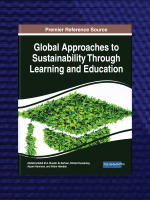 | Global Approaches to Sustainability Through Learning
and Education |
Profs. Abdalmuttaleb M.A. Musleh Al-Sartawi (Ahlia University, Bahrain) et al.
©2020 | 350 pgs. | EISBN: 9781799800644
| - Latest Research Findings of 25+ Researchers from Over
10+ Countries - Covers Topics such as Collaborative Innovation, Economic Intelligence, & Sustainable Education
- Suitable for Education Researchers, Policy Makers, &
Industry Leaders - Excellent Addition to Your Institution’s Library
|
| |
|
|
Recently, the
United Nations and the World Meteorological Organization released a report stating the number of deadly natural disasters has nominally increased from 1970 to 2019. These disasters have accounted for nearly
50% of disasters,
40% of deaths, and are causing
economic losses up to US$ 383 million per day globally. In the report, they note that human influence and climate change are causing this ongoing surge.
With 2021 continuing to experience ongoing natural disasters, including the recent Hurricane Ida, Australian wildfires, South Asia floods, and ongoing droughts, many countries have enacted new legislation and funding to help mitigate climate change and provide relief. However, these are not the only solutions that are emerging, as those born between 1997-2012 are taking the charge of combatting the climate crisis. According to a
2021 Pew Research report,
76% of Generation Z are noting that climate change is one of their biggest societal concerns. This coupled with activists emerging like Greta Thunberg, this increase in generational interest is resulting in an overwhelming number of students pursuing environmental-related degrees and careers.
In an effort to support the continued education around sustainability and sustainable development, Profs. Faruk Bhuiyan, from Macquarie University, Australia, and Md Hafij Ullah, from Coventry University, UK, discusses how institutions can incorporate sustainable education practices into curriculum in developing nations and beyond, in their chapter, “
'Sustainability Education' Practices at the Universities from a Developing Country Context,” featured in
Global Approaches to Sustainability Through Learning and Education (IGI Global).
| View a Preview of the Open Access Article Below |
|
Developing countries have been facing more challenges to sustainability than the developed countries. ITT (2017) provided that 92% of all pollution-related deaths occur in developing countries, and 25% of the deaths are attributable to pollution. Among the developing countries, Bangladesh is in severe environmental risks due to several reasons including financial capability, lack of technical and scientific resources, constraints in implementing rules and regulations, and administrative structure (Economic Commission for Africa, 2007; Futurism, 2018; ITT, 2017; Hossain & Alam, 2016). In addition, lack of sustainability education is leading to nescience about environmental protection among the people of the developing worlds (Biancardi & Villani, 2014). Moreover, there is a scarcity of research considering the sustainability issues of the developing countries (Belal & Roberts, 2010; Sobhani et al., 2012).
Education for sustainable development (ESD), commonly known as sustainability education, is considered a pathway to achieve sustainable development goals (SDGs). The target 7 under SDG 4 states that “by 2030, ensure that all learners acquire the knowledge and skills needed to promote sustainable development” (UN, 2015). In addition, sustainable education can be one of the effective options to achieve rest of the 16 sustainable development goals (SDGs), because only education can change the attitude and skills of people in a way that meets the needs of the current generation without compromising the ability of future generation to meet their needs.
Given the importance of sustainability education, the extant literature highlights that educational institutions are yet to reach at providing sustainable education mentioned at SDG 4.7. In line with providing sustainable education, some mentionable initiatives have already been taken at primary and secondary education level by different stakeholders including UNESCO, UN, state/local governments, and educational institutions throughout world (UNESCO, 2019; Salequzzaman and Gorana, 2016; Haque, 2013), while less focus has been given on the sustainability education at the tertiary levels, especially from developing economies
like Bangladesh.
Universities are considered as the center of developing quality professionals and responsible citizen. Currently, Bangladeshi universities (32 public and 84 private universities) are providing the tertiary education to a significant number (23%) of the total of 3.2 million students pursuing higher education (Mannan, 2017), thereby assume that sustainability education by universities in Bangladesh may be one of the effective ways of achieving SDG 4 (Bhowmik, Selim and Huq, 2017). Therefore, this book chapter evaluates the current sustainable education practices among the universities in Bangladesh. Given numerous challenges towards sustainability education practices by the universities from developing economies, this chapter also proposes a revised multi-level framework in order to enhance sustainability education practices among the universities in Bangladesh.
The required data were collected from the published sources of the Faculty of Business Administration of top 10 public and private universities (according to the University Grant Commission report 2018) in Bangladesh, and by conducting a questionnaire survey among teachers and students of the business faculty of the sample universities.
Complimentary Research Articles and Chapters on
Sustainability, Environmental Education, & Climate Change | | | | | Eco-Friendly Energy Processes and Technologies for Achieving Sustainable Development | Profs. Mir Sayed Shah Danish (University of the Ryukyus,
Japan) et al.
©2021 | 340 pgs. | EISBN: 9781799849162 | - Research from Over Five (5) Countries, Including Japan, Mexico, & Hong Kong
- Ideal Resource for Policymakers, Urban Planners, & Engineers
- Covers Topics such as Ethics, Climate Change,
& Renewable Energy - Excellent Addition to Your Institution’s Library
|
|
| |
| |
|
| | | | Cases on Green Energy and Sustainable Development | Prof. Peter Yang (Case Western Reserve University, USA)
©2020 | 583 pgs. | EISBN: 9781522585619 | - Edited by Leading Educator on Renewal Energy
- Research from Over 10 Countries, Including USA,
South Korea, & UK - Covers Topics such as Policy, Green Transportation,
& Economics - Excellent Addition to Your Institution’s Library
|
|
| |
| |
|
| | | | Research Anthology on Emergency and Disaster Management (3 Volumes) | Mehdi Khosrow-Pour, D.B.A.
©2019 | 1,723 pgs. | EISBN: 9781522561965 | - Features Three (3) Volumes with Over 75+ Chapters of the
Latest Research - Content Hand-Selected by IGI Global’s Expert Editorial Team
- Covers Topics such as Disaster Relief, Environmental Hazards, & Crisis Education
- Excellent Addition to Your Institution’s Library
|
|
| |
| |
|
| | | View All Chapters and Articles on This Topic | | The “View All Chapters and Articles on This Topic” navigates to IGI Global’s Demo Account, which provides a sample of the IGI Global content available through IGI Global’s e-Book Collection (6,600+ e-books) and e-Journal Collection (140+ e-journals) databases. If interested in having full access to this peer-reviewed research content,
Recommend These Valuable Research Tools to Your Library |
|

For Journalists Interested in Additional Trending Research
Contact IGI Global’s Marketing Team at marketing@igi-global.com or 717-533-8845 ext. 100 to access additional peer-reviewed resources to integrate into your latest news stories.
About IGI Global
Founded in 1988, IGI Global, an international academic publisher, is committed to producing the highest quality research (as an active full member of the Committee on Publication Ethics “COPE”) and ensuring the timely dissemination of innovative research findings through an expeditious and technologically advanced publishing process. Through their commitment to supporting the research community ahead of profitability, and taking a chance on virtually untapped topic coverage, IGI Global has been able to collaborate with over 100,000+ researchers from some of the most prominent research institutions around the world to publish the most emerging, peer-reviewed research across 350+ topics in 11 subject areas including business, computer science, education, engineering, social sciences, and more. To learn more about IGI Global, click here.
Newsroom Contact
Caroline Campbell
Assistant Director of Marketing and Sales
(717) 533-8845, ext. 144
ccampbell@igi-global.com
www.igi-global.com